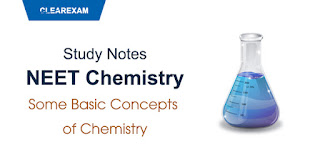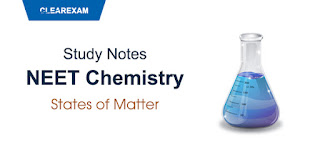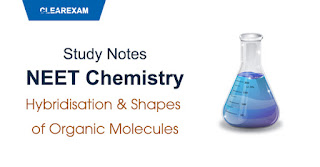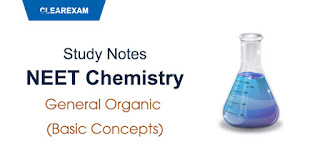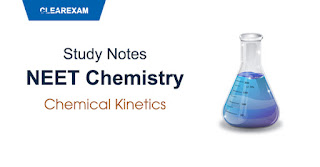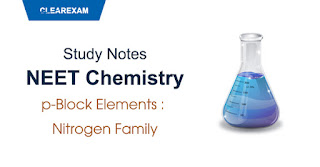
NEET Chemistry Study Notes PDF
Summary, Important Formula - Free Download
Every year lakhs of Aspirants dream to make it to the coveted and much respected MBBS, BDS, AYUSH and other medical courses in India. The completion has been rising year on year. Keeping this in mind, and seeing the ever evolving nature of entrance tests in India, we present to you a comprehensive coverage of the NEET Chemistry Study Notes PDF. The NEET exam introduced in 2013, replaced the AIPMT exam and all other state medical exams for admission into medical and dental courses in India. From onwards the National testing agency became responsible for conducting the NEET Exam.
The National Eligibility cum Entrance Test (Undergraduate) or NEET (UG), earlier known as the All India Pre-Medical Test (AIPMT) is an entrance test for admission into MBBS, BDS, AYUSH and various other undergraduate medical courses in recognized medical, dental and other colleges in India. It is the gateway to enter into prestigious institutes like AIIMS, JIPMER and other similar medical Institutes in India. NEET Chemistry Study Notes PDFs can be downloaded from here.
Like the previous two years, NEET (UG) will be conducted by the National Testing Agency (NTA). It will be a pen and paper based exam. The exam will be 3 hours long and will have 180 MCQ questions from Physics, Chemistry and Biology based on the prescribed syllabus. It is expected that the exam will be held on 02 May i.e. Sunday of the first week of May. NEET Chemistry Study Notes PDF can be downloaded from website.
The Chemistry syllabus for the exam is divided into 3 parts: Organic, Inorganic and Physical Chemistry. The chapters included in the exam are based on class 11th and 12th NCERT syllabus. Following are the chapters to study and their weightage:
|
|
Class 11th Chemistry syllabus. |
|
|
Class 12th Chemistry syllabus. |
|
|
Sr. No. |
Chapter |
Weightage |
Sr. No. |
Chapter |
Weightage |
|
1 |
Some Basic Concepts of Chemistry |
2% |
1 |
Solid State |
1% |
|
2 |
Structure of Atom |
5% |
2 |
Solutions
|
2% |
|
3 |
Classification of Elements and Periodicity in Properties |
2% |
3 |
Electrochemistry |
2% |
|
4 |
Chemical Bonding and Molecular Structure |
3% |
4 |
Chemical Kinetics |
5% |
|
5 |
States of Matter: Gases and Liquids |
2% |
5 |
Surface Chemistry
|
2% |
|
6 |
Thermodynamics |
2% |
6 |
General Principles and Processes of Isolation of Elements
|
8% |
|
7 |
Equilibrium |
5% |
7 |
p- Block Elements |
6% |
|
8 |
Redox Reactions |
4% |
8 |
d and f Block Elements
|
3% |
|
9 |
Hydrogen |
9% |
9 |
Coordination Compounds
|
3% |
|
10 |
s-Block Element (Alkali and Alkaline earth metals) |
3% |
10 |
Haloalkanes and Haloarenes |
2% |
|
11 |
Some p-Block Elements |
4% |
11 |
Alcohols, Phenols and Ethers
|
2% |
|
12 |
Organic Chemistry- Some Basic Principles and Techniques |
4% |
12 |
Aldehydes, Ketones and Carboxylic Acids |
4% |
|
13 |
Hydrocarbons |
2% |
13 |
Organic Compounds Containing Nitrogen
|
3% |
|
14 |
Environmental Chemistry |
3% |
14 |
Biomolecules
|
2% |
|
|
|
|
15 |
Polymers
|
3% |
|
|
|
|
16 |
Chemistry in Everyday Life
|
2% |
- STRUCTURE OF ATOM
- CLASSIFICATION OF ELEMENTS AND PERIODICITY IN PROPERTIES
- CHEMICAL BONDING AND MOLECULAR STRUCTURE
- STATES OF MATTER
- SOME BASIC CONCEPTS OF CHEMISTRY
- STRUCTURE OF ATOM
- CLASSIFICATION OF ELEMENTS AND PERIODICITY IN PROPERTIES
- CHEMICAL BONDING AND MOLECULAR STRUCTURE
- STATES OF MATTER
- THERMODYNAMICS
- CHEMICAL EQUILIBRIUM
- IONIC EQUILIBRIUM
- REDOX REACTION
- HYDROGEN
- S-BLOCK ELEMENTS - ALKALI METALS
- S-BLOCK ELEMENTS - ALKALINE EARTH METALS
- P-BLOCK ELEMENTS - BORON FAMILY
- P-BLOCK ELEMENTS - CARBON FAMILY
- CLASSIFICATION AND NOMENCLATURE OF ORGANIC COMPOUNDS
- HYBRIDISATION AND SHAPES OF ORGANIC MOLECULES
- BASIC CONCEPTS OF ORGANIC CHEMISTRY
- ISOMERISM
- HYDROCARBONS
- ENVIRONMENTAL CHEMISTRY
- SOLID STATE
- SOLUTIONS
- ELECTROCHEMISTRY
- CHEMICAL KINETICS
- SURFACE CHEMISTRY
- GENERAL PRINCIPLES AND PROCESSES OF ISOLATION OF ELEMENTS
- p-BLOCK ELEMENTS - NITROGEN FAMILY
- p-BLOCK ELEMENTS - OXYGEN FAMILY
- p-BLOCK ELEMENTS - HALOGENS
- p-BLOCK ELEMENTS - NOBLE GASES
- d- AND f-BLOCK ELEMENTS
- COORDINATION COMPOUNDS
- HALOALKANES & HALOARENES
- ALCOHOLS, PHENOLS AND ETHER
- ALDEHYDES AND KETONES
- CARBOXYLIC ACIDS AND THEIR DERIVATIVES
- AMINES
- BIOMOLECULES
- POLYMERS
- CHEMISTRY IN EVERYDAY LIFE
- VOLUMETRIC ANALYSIS
- PRACTICAL CHEMISTRY
- First of all study your class 11th and class 12th NCERT books very thoroughly. Make sure to solve all the practice problems and examples mentioned within each chapter. Note down important notes and formula while reading each chapter.
- Next solve the practice problems that are given at the end of each chapter in NCERT. Note down the tricks that you are using to solve the questions quickly.
- Once your comprehensive notes are prepared, shorten them down such that all your important concepts, reactions and formulae are noted within a few pages. This will help you revise the entire Chemistry syllabus in only a few hours before each mock test and also before the final NEET exam.
- Next, solve previous year questions and additional problems from reference books. Keep giving mock tests regularly and note down the answers to the questions that you have marked wrong.
- Memorize important reactions, diagrams and formulae regularly.
- Revision is the key to success. Keep revising your notes and formulae regularly, especially the exceptions to each reaction and formula. Exceptions are very important to remember as sometimes directly questions are asked based on them.
- For Organic Chemistry : This constitute about 28% of NEET Chemistry syllabus. To score well in organic chemistry, it is a must to be thorough with NCERTs. Students should try to understand the mechanism of the reactions, the exceptions to all reactions and most importantly, be absolutely clear with IUPAC and common names of all organic compounds. The key is to practice regularly and practice as many types of questions as you can.
- For Inorganic Chemistry : Its weightage is about 36% in the NEET chemistry syllabus. This section is generally considered to be memory based. Thus, it is important to be thorough with NCERTs and to write down and practice reactions regularly and memorize exceptions.
- For Physical Chemistry :This sections involves numerical problems. Thus, it becomes important to be fast and accurate in calculations. This section also requires candidates to be thorough with their NCERTs and practice of numerical problems regularly.
- There are a total of 180 questions in NEET that are divided into three sections of Physics, Chemistry and Biology.
- The highest weightage is of Biology section which has 90 questions. Physics and Chemistry have 45 questions each. Total marks are 720. Biology is of 360 marks and Chemistry and Physics each are of 180 marks.
- For every correct answer there are 4 marks awarded. Every wrong answer earns -1 mark.
- A target score of 650 or above will help you get a comfortable rank that can ensure you admission in top medical colleges and medical courses in India
- Once you have understood the exam pattern well and have gone through the syllabus for the exam, you should try to identify your strong subject and topics.
- Keep working on your strong areas but devote more time initially to perfect your weak areas and topics.
- Make a priority wise list of topics on the basis of their weightage given in the syllabus. Try to finish studying the topics in order of their priority i.e. finish topics having more weightage in the exam first. Start with Biology and then move on to Physics and Chemistry.
- Getting a good score of 650+ will require a lot of devotion from your side. You will need to devote at least 10-12 hours per day towards your studies.
- Understanding the exam pattern and syllabus is just the stepping stone. The real journey starts when you start to study.
- Since Biology has half of the total weightage, begin with that. Choose another subject out of Physics and Chemistry according to your analysis of which one of these you are stronger in. start with topics you are good at and that have higher weightage.
- Begin your preparation with reading NCERTs thoroughly. Mark and highlight important points in them. When you have gone through them, you can move on to additional reading material and reference books.
- Make notes of Biology from all these NCERTs and books . Try to use coloured pens while taking notes and making diagrams. This way it will be easier to memorize diagrams visually and revise quickly later. This also makes revision less monotonous and boring. Diagrams are very important for NEET
- Physics requires you to practice as many questions as you can. The best way to remember formulas is by practicing questions based on them. Making a formula sheet of all the important laws and formulas in Physics can help you with quick revision when NEET Exam is near
- For chemistry again you will need to remember equations and formulas and practice as many questions as you can. Making a formula sheet here too will help you with quick revision later.
- It goes without saying that when it comes to clearing competitive exams, or any exam for that matter, there is no substitute to practice.
- When you practice questions, you begin to understand the gaps in your understanding
- But, practicing without any time limit will not be very beneficial to you. Time your tests and see how you perform within the constraint of time
- Keep a separate notebook was you note down all the questions that you did wrong or were not able to attempt. Analysing the tests is even more important than just giving the tests.
- Initially, start with chapter wise tests. When you complete a subject, attempt a subject wise test. When you have gone through the entire syllabus at least once and have attempted sufficient questions in each topic, then start taking full length tests.
- The best question bank you can get is the previous year question papers. Practice them thoroughly.
- The immense hard work that you will put during your preparation will be of no use if you don’t revise.
- Make a revision schedule for yourself detailing the date and topic to be revised each day.
- Make sure that you have started your revision at least 3-4 months before the NEET exam. To cover the huge syllabus in revision will be a lengthy task and will require time. Hence, don’t keep revision for the last moment.
- It can be stressful to prepare at home during this time. But, use this as an opportunity. Use the online resources available and join a good test series available online.
- Try to keep calm and stay focussed. Practice meditation and do light exercise to relieve stress.
- Talk to your friend. Ask them how they are doing and discuss about their preparation strategy. This will give you a break from your monotonous routine and also help you understand how others are adapting to the situation.
- Maintain a healthy diet. Try to avoid junk food and eat fresh fruits. Small snacks at regular intervals of time boost overall cognitive function and help you focus better.
- Don’t forget to hydrate. Drink lots of water at regular intervals.
- Try to include Iron and vitamin B rich food into your diet. This will help boost brain power.
- It’s very important to get a good sleep. Get 6-7 hours of sleep on an everyday basis. Lack of sleep affects memory, focus and overall wellbeing.
- Make the most of your online classes. Ask doubts freely as you are sitting in the comfort of your home and participate in the class discussion
- Take notes of whatever is being taught in the class for a quick revision later.
- Don’t forget to stretch. It is advisable to take a break after a 2 to 3 hour sitting.
- Last but not the least, keep practicing consistently during this time. This is your time to turn difficulty into opportunity. Make the most of it.
- Going through the syllabus is only half the work. The key to scoring good marks is effective revision. Once you have completed your course for the exam, it is important to chalk out a detailed revision schedule to revise for the exam.
- As much as it is important to work hard, it is equally important to relax. It is suggested that after every 1 hour slot of focussed studying, you take a break for 5 – 10 minutes. This will refresh your mind and you can focus better and retain things in a more effective manner.
- Another important aspect that you need to take care of is your health, both physical and mental health. Include healthy and balanced food in your diet and try to exercise daily, even if for 15 minutes.
- Practice and analyse NEET mock tests and previous years questions daily. Practicing questions will help you revise effectively, improve your time management skills and boost your confidence.
- Keep a formula sheet of each subject ready with you. In the last few days, keep revising the formula sheet. Since a lot of questions in the NEET exam are directly based on the formulae, doing this will help save immense amount of time in the exam and will also improve your NEET score and ranking.
- As was suggested before, diagrams help a lot in remembering long and complex information. Practice the diagrams that you have prepared while making your notes initially multiple times. This will help you easily recollect information while attempting questions in the exam.
- The last few days are very stressful for any candidate. It is thus very difficult to remember any new information during this time. Hence, avoid starting any new topic as it will put you under stress and confuse you and you might not be able to devote time effectively to the revision of topics that you had practiced before.
- Work on areas which are your strength during the last few days. These areas will help you improve your score as you must have practiced them a lot and will help you feel confident during the exam.
- Before entering a exam hall, try and have no doubts or confusion left in your mind. Clear all your doubts and queries beforehand from your teachers and friends. You can also refer to free online video lectures to clear your doubts.
- Work on improving your accuracy and your speed. There are 180 questions in the NEET exam and you will need to answer the maximum questions correctly in order to get a good rank and score. Thus speed matters.
- Wake up early on the day of the exam. Waking up early will help you feel fresh during the exam and help you attempt it with a clear mind.
- Remember to keep all the important documents and stationary with you before you leave your home for the exam centre. Keep the following documents ready with you one night before the exam:
- 1 postcard size photograph that would be affixed on the Performa
- 1 passport sized photograph that would be affixed on the attendance sheet.
- Admit card of NEET with a photo affixed on it.
- Proof of identity( Aadhar, Driving licence, PAN card, passport etc)
- Electronic or communication devices- mobile phones, earphones, microphones, Bluetooth, pagers etc
- Ornaments- rings, Nose-pin, Earrings Chain/Necklace, Pendants, Bracelet, Badge, Brooch etc.
- Stationery Items- bits of papers, Textual material (printed or written, plastic pouch), geometry/pencil box, calculator, writing pad, pen, scale, pen drives, eraser, calculator, log table, electronic pen/scanner etc.
- Watches - Watch/wrist watch, camera, etc.
- Other items - goggles, handbags, wallet, hair pin, hair band, belt, cap, scarf, amulets, eatable (opened or packed) etc. And, any metallic items that can be used for unfair means or for hiding communication devices like mobile, earphones, microphones, Bluetooth device, camera etc.
- It is very important to remember that exams are all about strategy. Hence when you attempt the exam, play to your strengths. Attempt sections that are your strengths and then move on to the ones that you find tougher.
- Exam papers have mixed difficulty level questions. It is important to choose the right questions to attempt first. In case you get stuck on a difficult question, do not waste much time. Leave it and move on to the next question. When you are done attempting all the questions, come back to revisit the questions that you had not attempted before.
- If you are finished attempting all the questions and are left with time, you can recheck all the answers once more to find out any mistakes that you might have made.
- Finally, it is very important to keep calm and relaxed during the exam. If you get stuck at a question, don’t panic. Chances are others must be finding it tough too. Have confidence in your preparation.
- The application process will be started by NTA
- The application forms can be filled only in the online mode. No separate offline forms will be available
- The forms will tentatively be available from the first week of December
- Forms will be open till first week of January for filling
- Payment can be done through Credit/Debit cards, E-wallets, Net Banking or via challan.
- Admit cards will be released tentatively by second week of April
- The exam will bw held in the first week of May
Whether it's a test or a competitive exam, notes play an important role in every preparation! That's why ClearExam takes care of your NEET Exam Preparation by offering Shorts notes for NEET Chemistry Study Notes PDF including Chemistry short notes summary and Important formulae.
Important Books for Chemistry
The NEET chemistry exam is of 180 marks and consists of 45 questions. Every aspirant should make it a point to go through the following books, make notes from them, read solved examples and practice unsolved problems.
· NCERT books for class 11th and 12th
· ABC of Chemistry for class 11th and 12th by Modern
· Physical Chemistry by O.P. Tandon
· Concise Inorganic Chemistry by J.D. Lee
· Dinesh Chemistry Guide
· Practice books by V.K. Jaiswal for Inorganic Chemistry
· Practice books by M.S. Chauhan for Organic Chemistry
· Practice books by N Awasthi for Physical Chemistry
Tips for preparing notes for Chemistry
General tips to prepare for the NEET exam
Know the Exam Pattern very well
Begin Studying
Practice, Practice, Practice
Revise
Preparing during the times of Covid 19- Things to keep in mind
Important Chemical compounds and their formulas
|
Sl.No |
Formula |
Name of the Chemical Compound |
|
1 |
CH3COOH |
Acetic acid |
|
2 |
Al(OH)3 |
Aluminium Hydroxide |
|
3 |
CH3COO- |
Acetate |
|
4 |
C3H6O |
Acetone |
|
5 |
Al2O(C2H3O2)4 |
Aluminium Acetate |
|
6 |
AlBr3 |
Aluminium Bromide |
|
7 |
Al2(CO3)3 |
Aluminium Carbonate |
|
8 |
AlCl3 |
Aluminium Chloride |
|
9 |
AlF3 |
Aluminium Fluoride |
|
10 |
Al |
Aluminium |
|
11 |
AlI3 |
Aluminium Iodide |
|
12 |
Al2O3 |
Aluminium Oxide |
|
13 |
AlPO4 |
Aluminium Phosphate |
|
14 |
R(NH2)-COOH |
Amino Acid |
|
15 |
NH4 |
Ammonia |
|
16 |
Cr2H8N2O7 |
Ammonium dichromate |
|
17 |
C2H3O2NH4 |
Ammonium Acetate |
|
18 |
NH4HCO3 |
Ammonium Bicarbonate |
|
19 |
NH4Br |
Ammonium Bromide |
|
20 |
(NH4)2CO3 |
Ammonium Carbonate |
|
21 |
NH4Cl |
Ammonium Chloride |
|
22 |
NH4OH |
Ammonium Hydroxide |
|
23 |
NH4I |
Ammonium Iodide |
|
24 |
NH4NO3 |
Ammonium Nitrate |
|
25 |
Al2S3 |
Aluminium Sulphide |
|
26 |
NH4NO2 |
Ammonium Nitrite |
|
27 |
(NH4)2O |
Ammonium Oxide |
|
28 |
(NH4)3PO4 |
Ammonium Phosphate |
|
29 |
(NH4)2SO4 |
Ammonium Sulphate |
|
30 |
(NH4)2S |
Ammonium sulphide |
|
31 |
Ar |
Argon |
|
32 |
C6H8O6 |
Ascorbic acid |
|
33 |
Ba(C2H3O2)2 |
Barium acetate |
|
34 |
BaBr2 |
Barium Bromide |
|
35 |
BaCl2 |
Barium Chloride |
|
36 |
BaF2 |
Barium Fluoride |
|
37 |
Ba(OH)2 |
Barium Hydroxide |
|
38 |
BaI2 |
Barium Iodide |
|
39 |
Ba(NO3)2 |
Barium nitrate |
|
40 |
BaO |
Barium oxide |
|
41 |
Ba3O8P2 |
Barium phosphate |
|
42 |
BaSO4 |
Barium sulphate |
|
43 |
C6H6 |
Benzene |
|
44 |
C7H6O2 |
Benzoic acid |
|
45 |
CHO3– |
Bicarbonate |
|
46 |
NaClO |
Bleach |
|
47 |
H3BO3 |
Boric acid |
|
48 |
KBrO3 |
Potassium Bromate |
|
49 |
HBrO3 |
Bromic acid |
|
50 |
Br |
Bromine |
|
51 |
C4H10 |
Butane |
|
52 |
C4H8O2 |
Butanoic acid |
|
53 |
Ca(COO–)2 |
Calcium acetate |
|
54 |
CaBr2 |
Calcium bromide |
|
55 |
CaCO3 |
Calcium carbonate |
|
56 |
CaH2 |
Calcium hydride |
|
57 |
Ca(OH)2 |
Calcium hydroxide |
|
58 |
CaI2 |
Calcium iodide |
|
59 |
Ca(NO3)2 |
Calcium nitrate |
|
60 |
CaO |
Calcium oxide |
|
61 |
CO |
Carbon monoxide |
|
62 |
CCl4 |
Carbon tetrachloride |
|
63 |
H2CO3 |
Carbonic acid |
|
64 |
Ca3(PO4)2 |
Calcium phosphate |
|
65 |
H2CO3 |
Carbonic acid |
|
66 |
C6H8O7 |
Citric acid |
|
67 |
ClO–3 |
Chlorate |
|
68 |
Cl2 |
Chlorine |
|
69 |
Cl2 |
Chlorine gas |
|
70 |
HClO2 |
Chlorous acid |
|
71 |
CrO42- |
Chromate |
|
72 |
H2CrO4 |
Chromic acid |
|
73 |
C6H8O7 |
Citric acid |
|
74 |
CuCO3 |
Copper ii carbonate |
|
75 |
Cu(NO3)2 |
Copper ii nitrate |
|
76 |
CN- |
Cyanide |
|
77 |
K2Cr2O7 |
Dichromate |
|
78 |
H2O |
Dihydrogen monoxide |
|
79 |
N2O |
Dinitrogen monoxide |
|
80 |
N2O5 |
Dinitrogenpentoxide |
|
81 |
N2O3 |
Dinitrogen trioxide |
|
82 |
C2H5OH |
Ethanol |
|
83 |
Fe2O3 |
Iron oxide |
|
84 |
C2H6O2 |
Ethylene glycol |
|
85 |
F2 |
Fluorine gas |
|
86 |
AlBr3 |
Aluminum bromide |
|
87 |
Al2S3 |
Aluminumsulphide |
|
88 |
(NH4)2CO3 |
Ammonium carbonate |
|
89 |
(NH4)(NO3) |
Ammonium nitrate |
|
90 |
(NH4)3PO4 |
Ammonium phosphate |
|
91 |
BaCl2 |
Barium chloride |
|
92 |
BaSO4 |
Barium sulphate |
|
93 |
Ca(NO3)2 |
Calcium nitrate |
|
94 |
CO |
Carbon monoxide |
|
95 |
CCl4 |
Carbon tetrachloride |
|
96 |
H2CO3 |
Carbonic acid |
|
97 |
HF |
Hydrofluoric acid |
|
98 |
HI |
Hydroiodic acid |
|
99 |
HClO |
Hypochlorous acid |
|
100 |
Li3PO4 |
Lithium phosphate |
|
101 |
MgNO3 |
Magnesium nitrate |
|
102 |
Mg3(PO4)2 |
Magnesium phosphate |
|
103 |
NO |
Nitrogen monoxide |
|
104 |
HNO2 |
Nitrous acid |
|
105 |
K2CO3 |
Potassium carbonate |
|
106 |
KI |
Potassium iodide |
|
107 |
KNO3 |
Potassium nitrate |
|
108 |
KH2PO4 |
Potassium phosphate |
|
109 |
Na2CO3 |
Sodium carbonate |
|
110 |
Na2O |
Sodium oxide |
|
111 |
C6H12O6 |
Fructose chemical |
|
112 |
C3H8O3 |
Glycerol |
|
113 |
He |
Helium gas |
|
114 |
C6H14 |
Hexane |
|
115 |
HBr |
Hydrobromic acid |
|
116 |
HCl |
Hydrochloric acid |
|
117 |
HCN |
Hydrocyanic acid |
|
118 |
HF |
Hydrofluoric acid |
|
119 |
CHO3– |
Hydrogen carbonate |
|
120 |
H2 |
Hydrogen gas |
|
121 |
H2O2 |
Hydrogen peroxide |
|
122 |
H3PO4 |
Hydrogen phosphate |
|
123 |
HSO4– |
Hydrogen sulfate |
|
124 |
HI |
Hydroiodic acid |
|
125 |
H2SO4 |
Hydrosulfuric acid |
|
126 |
OH– |
Hydroxide |
|
127 |
HBrO |
Hypobromous acid |
|
128 |
NaClO |
Hypochlorite |
|
129 |
HClO |
Hypochlorous acid |
|
130 |
HIO |
Hypoiodous acid |
|
131 |
HIO3 |
Iodic acid |
|
132 |
I2 |
Iodide |
|
133 |
I2 |
Iodine |
|
134 |
Fe(NO3)3 |
Iron iii nitrate |
|
135 |
FeO |
Iron ii oxide |
|
136 |
Fe2(CO3)3 |
Iron iii carbonate |
|
137 |
Fe(OH)3 |
Iron iii hydroxide |
|
138 |
Fe2O3 |
Iron iii oxide |
|
139 |
FeCl3 |
Iron iii chloride |
|
140 |
C3H6O3 |
Lactic acid |
|
141 |
Pb(C2H3O2)2 |
Lead acetate |
|
142 |
Pb(C2H3O2)2 |
Lead ii acetate |
|
143 |
PbI2 |
Lead iodide |
|
144 |
PbO2 |
Lead iv oxide |
|
145 |
Pb(NO3)2 |
Lead nitrate |
|
146 |
LiBr |
Lithium bromide |
|
147 |
LiCl2 |
Lithium chloride |
|
148 |
LiOH |
Lithium hydroxide |
|
149 |
LiI2 |
Lithium iodide |
|
150 |
Li2O |
Lithium oxide |
|
151 |
Li3PO4 |
Lithium phosphate |
|
152 |
Mg(CH3COO)2 |
Magnesium acetate |
|
153 |
MgCO3 |
Magnesium bicarbonate |
|
154 |
MgCO3 |
Magnesium carbonate |
|
155 |
MgCl2 |
Magnesium chloride |
|
156 |
Mg(OH)3 |
Magnesium hydroxide |
|
157 |
MgI2 |
Magnesium iodide |
|
158 |
Mg(NO3)2 |
Magnesium nitrate |
|
159 |
Mg3N2 |
Magnesium nitride |
|
160 |
MgCO3 |
Magnesium carbonate |
|
161 |
MgBr2 |
Magnesium bromide |
|
162 |
MgO |
Magnesium oxide |
|
163 |
Mg3(PO4)2 |
Magnesium phosphate |
|
164 |
MgSO4 |
Magnesium sulfate |
|
165 |
MgS |
Magnesium sulfide |
|
166 |
CH4 |
Methane |
|
167 |
CH3OH |
Methanol |
|
168 |
Ni(C2H3O2)2 |
Nickel acetate |
|
169 |
Ni(NO3)2 |
Nickel nitrate |
|
170 |
HNO3 |
Nitric acid |
|
171 |
N3 |
Nitride |
|
172 |
NO2− |
Nitrite |
|
173 |
NO2 |
Nitrogen dioxide |
|
174 |
NO |
Nitrogen monoxide |
|
175 |
HNO2 |
Nitrous acid |
|
176 |
C2O42− |
Oxalate |
|
177 |
H2C2O4 |
Oxalic acid |
|
178 |
O2 |
Oxygen |
|
179 |
O3 |
Ozone |
|
180 |
HBrO4 |
Perbromic acid |
|
181 |
KMnO4 |
Potassium Permanganate |
|
182 |
MnO4– |
Permanganate ion |
|
183 |
PO43- |
Phosphate |
|
184 |
Na2HPO4 |
Sodium hydrogen phosphate |
|
185 |
CHNaO2 |
Sodium formate |
|
186 |
H3PO4 |
Phosphoric acid |
|
187 |
PCl5 |
Phosphorus pentachloride |
|
188 |
PCl3 |
Phosphorus trichloride |
|
189 |
CH3CO2K |
Potassium acetate |
|
190 |
KHCO3 |
Potassium bicarbonate |
|
191 |
K2CO3 |
Potassium carbonate |
|
192 |
KClO3 |
Potassium chlorate |
|
193 |
K2HPO4 |
Potassium hydrogen phosphate |
|
194 |
KCl |
Potassium chloride |
|
195 |
CrK2O4 |
Potassium chromate |
|
196 |
KCN |
Potassium cyanide |
|
197 |
K2Cr2O7 |
Potassium dichromate |
|
198 |
KF |
Potassium fluoride |
|
199 |
KOH |
Potassium hydroxide |
|
200 |
KClO3 |
Potassium hypochlorite |
|
201 |
KI |
Potassium iodide |
|
201 |
KH2PO4 |
Potassium dihydrogen phosphate |
|
203 |
KNO3 |
Potassium nitrate |
|
204 |
KNO2 |
Potassium nitrite |
|
205 |
K2O |
Potassium oxide |
|
206 |
KIO3 |
Potassium iodate |
|
207 |
KH2PO4 |
Potassium phosphate |
|
208 |
K2SO3 |
Potassium sulphite |
|
209 |
C7H6O3 |
Salicylic acid |
|
210 |
SiO2 |
Silicon dioxide |
|
211 |
AgC2H3O2 |
Silver acetate |
|
212 |
Ag2CO3 |
Silver carbonate |
|
213 |
AgCl |
Silver chloride |
|
214 |
AgNO3 |
Silver nitrate |
|
215 |
Ag2O |
Silver oxide |
|
216 |
Ag3PO4 |
Silver phosphate |
|
217 |
C2H3NaO2 |
Sodium acetate |
|
218 |
NaHCO3 |
Sodium bicarbonate |
|
219 |
NaBr |
Sodium bromide |
|
220 |
Na2S2O3 |
Sodium thiosulfate |
|
221 |
Na2CO3 |
Sodium carbonate |
|
222 |
NaCl |
Sodium chloride |
|
223 |
Na2CrO4 |
Sodium chromate |
|
224 |
Na3C6H5O7 |
Sodium citrate |
|
225 |
NaCN |
Sodium cyanide |
|
226 |
Na2Cr2O7 |
Sodium dichromate |
|
227 |
NaF |
Sodium fluoride |
|
228 |
NaOH |
Sodium hydroxide |
|
229 |
NaClO |
Sodium hypochlorite |
|
230 |
NaI |
Sodium iodide |
|
231 |
C5H4N4O3 |
Uric acid |
|
232 |
NaNO3 |
Sodium nitrate |
|
233 |
Na3N |
Sodium nitride |
|
234 |
NaNO2 |
Sodium nitrite |
|
235 |
Na2O |
Sodium oxide |
|
236 |
Na2O2 |
Sodium peroxide |
|
237 |
Na3PO4 |
Sodium phosphate |
|
238 |
Na2SO4 |
Sodium sulphate |
|
239 |
Na2S |
Sodium sulphide |
|
240 |
Na2SO3 |
Sodium sulphite |
|
241 |
SrCl2 |
Strontium chloride |
|
242 |
Sr(NO3)2 |
Strontium nitrate |
|
243 |
C12H22O11 |
Sucrose |
|
244 |
C12H22O11 |
Sugar |
|
245 |
SO42− |
Sulphate ion |
|
246 |
SO2 |
Sulphur dioxide |
|
247 |
SO3 |
Sulphur trioxide |
|
248 |
H2SO4 |
Sulphuric acid |
|
249 |
H2SO3 |
Sulphurous acid |
|
250 |
C4H6O6 |
Tartaric acid |
|
251 |
C7H8 |
Toluene |
|
252 |
CH4N2O |
Urea |
|
253 |
C2H4O2 |
Vinegar |
|
254 |
Zn(O2CCH3)2 |
Zinc acetate |
|
255 |
ZnCO3 |
Zinc carbonate |
|
256 |
ZnCl2 |
Zinc chloride |
|
257 |
Zn(OH)2 |
Zinc hydroxide |
|
258 |
ZnI2 |
Zinc iodide |
|
259 |
Zn(NO3)2 |
Zinc nitrate |
|
260 |
Zn3(PO4)2 |
Zinc phosphate |
|
261 |
ZnSO4 |
Zinc sulphate |
|
262 |
ZnS |
Zinc sulphide |
Last minute preparation tips for the NEET exam
Also, this is not the time to start new topics. It is suggested that you do multiple revisions of topics that you have already completed.
Ignoring your health and not eating properly might reduce your energy level and power to concentrate properly. Thus, you may end up feeling sleepy on the day of the exam.
Select any one or two of NEET free online test series and practice the entire set. Analyse your mistakes and note them down in a separate notebook. Keep revising the notebook so that you don’t make the same mistakes in the exam.
Also work on your accuracy. Each question answered incorrectly will get you a -1 which will bring down your score. Thus, try and get your concepts clear so that you do not get negative marking.
Now that we know how to prepare and last minute tips for the exam, let us see what things you need to keep in mind on the day of the exam.
D-Day Tips for NEET exam
The NTA also specifies a list of items that are prohibited in the exam hall. Here is the list:
Important Dates for NEET
The final dates for NEET cycle are yet to be declared. But here are the tentative dates to give you an idea and help you plan accordingly for the time being. Keep a tab on the official notifications coming from NTA so that you don’t miss the deadline for filling application.
|
Event |
Dates |
|
Tentative release of Application forms |
1st week of December |
|
Tentative Last date to fill the form and register |
1st week of January |
|
Release of admit cards |
2nd week of April |
|
Tentative date of exam |
1st week of May |
|
Tentative result announcement |
1stWeek of June |
Details of Application form for NEET
NTA NEET (UG) cut-off marks
The cut-off marks for NEET will be released at the time of declaration of results. Till such time aspirants can refer to previous year’s cut-off marks to get an idea of the cut-offs.
|
Category |
Percentile for qualifying |
Cut-off marks |
|
General/UR |
50th |
147 |
|
General with disability |
45th |
129 |
|
SC/ST/OBC |
40th |
113 |
|
SC/ST/OBC with disability |
40th |
113 |
Pattern of NEET exam
To prepare effectively for any exam, it is important to understand the pattern of the exam and then plan accordingly. Here is the pattern of the NEET exam conducted by NTA.
|
Exam duration |
3 hours |
|
Mode of exam |
Offline or pen and paper based |
|
Total number of questions |
180 |
|
Total number of marks |
720 |
|
Questions per section |
Physics- 45 Chemistry – 45 Biology-90 ( Zoology- 45 & Botany-45)
|
|
Question Type |
Multiple Choice Question ( MCQ) |
|
Exam Medium/Language |
English, Hindi, Assamese, Bengali, Gujarati, Marathi, Tamil, Telugu, Oriya, Kannada, and Urdu |
|
Marking Scheme |
Correct answer - +4 Incorrect answer- -1 Not attempted – 0
|
Eligibility criteria for NEET
To be eligible for the exam, a student must have to meet certain minimum requirements of qualification, age, qualifying marks, number of attempts and nationality, and fill the forms in the specified time window. They need to have at least 50% marks in qualifying examination if they are from unreserved category and 40% marks if they are from reserved category. They should be an Indian national, NRI, PIO, OCI or they can be a foreign national but they should turning 17 on or before the last day. The NEET eligibility criteria have been listed below for your convenience:
|
Parameters |
Requirements |
|
Qualifying exam |
A candidate must have passed class 12th board examination from a recognized board with Physics, Chemistry, Biology/Biotechnology and English as the main subjects. Candidates appearing in the board exams are also eligible to apply but they have to submit the necessary documentary evidence of passing at the time of counselling. |
|
Qualifying marks |
Only the aggregate marks of PCB, obtained in class 12th will be considered for this purpose. The qualifying marks differ with categories as follows: · UR-50% · OBC/SC/ST-40% · PWD-45% |
|
Minimum age limit |
The candidate must have completed 17 years of age at the time of admission or should be completing that age as on 31 December |
|
Maximum age limit |
The maximum age limit will be decided after the Supreme court passes its judgement on it. Till that time there is no age limit. |
|
Maximum attempts |
There are no restrictions on the maximum number of attempts |
|
Nationality |
The following are eligible to apply: · Indian Nationals · NRIs · PIOs · OCIs · Foreign Nationals |
Note: Candidates should go through the NEET UG eligibility criteria beforehand in order to avoid any last minute confusion while filling the form.
Top Colleges in India giving admission through NEET
|
NIRF Ranking |
State/UT |
Name of College/Institute |
|
1 |
Delhi |
All India Institute of Medical Sciences (AIIMS), New Delhi |
|
2 |
Chandigarh |
Post Graduate Institute of Medical Education and Research, Chandigarh |
|
3 |
Tamil Nadu |
Christian Medical College, Vellore |
|
4 |
Karnataka |
National Institute of Mental Health &Neuro Sciences, Bangalore |
|
5 |
Uttar Pradesh |
Sanjay Gandhi Postgraduate Institute of Medical Sciences, Lucknow |
|
6 |
Uttar Pradesh |
Banaras Hindu University, Varanasi |
|
7 |
Kerala |
Amrita Institute of Medical Sciences & Research, Kochi |
|
8 |
Pondicherry |
Jawaharlal Institute of Post Graduate Medical Education & Research (JIPMER), Puducherry |
|
9 |
Karnataka |
Kasturba Medical College, Manipal |
|
10 |
Uttar Pradesh |
King George’s Medical University, Lucknow |
|
11 |
Delhi |
Institute of Liver and Biliary Sciences, New Delhi |
|
12 |
Tamil Nadu |
Madras Medical College and Government General Hospital, Chennai |
|
13 |
Tamil Nadu |
Sri Ramachandra Institute of Higher Education And Research, Chennai |
|
14 |
Karnataka |
St. John's Medical College, Bengaluru |
|
15 |
Uttar Pradesh |
Aligarh Muslim University |
|
16 |
Delhi |
VardhmanMahavir Medical College and Safdarjung Hospital, New Delhi |
|
17 |
Delhi |
Maulana Azad Medical College, Delhi |
|
18 |
Punjab |
Christian Medical College, Ludhiana |
|
19 |
Delhi |
University College of Medical Sciences, Delhi |
|
20 |
Karnataka |
JSS Medical College, Mysore |
|
21 |
Karnataka |
Kasturba Medical College, Mangaluru |
|
22 |
Delhi |
JamiaHamdard, New Delhi |
|
23 |
Odisha |
Siksha ‘O’ Anusandhan, Bhubaneswar |
|
24 |
Maharashtra |
Dr. D. Y. PatilVidyapeeth, Pune |
|
25 |
Chandigarh |
Govt. Medical College and Hospital, Chandigarh |
|
26 |
Punjab |
Dayanand Medical College, Ludhiana |
|
27 |
Rajasthan |
Sawai Man Singh Medical College, Jaipur |
|
28 |
Tamil Nadu |
PSG Institute of Medical Sciences and Research, Coimbatore |
|
29 |
Maharashtra |
DattaMeghe Institute of Medical Sciences, Wardha |
|
30 |
Karnataka |
M. S. Ramaiah Medical College, Bengaluru |
|
31 |
Tamil Nadu |
S. R. M. Institute of Science and Technology, Chennai |
|
32 |
Odisha |
Kalinga Institute of Industrial Technology, Bhubaneswar |
|
33 |
Haryana |
Maharishi Markandeshwar, Ambala |
|
34 |
Tamil Nadu |
Saveetha Institute of Medical and Technical Sciences, Chennai |
|
35 |
Tamil Nadu |
Annamalai University, Annamalainagar |
|
36 |
Karnataka |
K. S. Hegde Medical Academy, Mangaluru |
|
37 |
Maharashtra |
Krishna Institute of Medical Sciences, Karad |
|
38 |
Andhra Pradesh |
Sri Venkateswara Institute of Medical Sciences, Tirupati |
|
39 |
Manipur |
Regional Institute of Medical Sciences, Imphal West |
|
40 |
Pondicherry |
Mahatma Gandhi Medical College and Research Institute, Puducherry |
About NTA
NTA is a premier, specialist, self-sustained and autonomous organization that was established to conduct tests for admission into higher education institutions. Assessing the competence of candidates for admissions and recruitment was always a challenge in terms of matching with research based international standards, transparency, efficiency, and error free delivery. The National Testing Agency was formed to address all such issues using the best methods in every field, from test preparation, to delivery of test and to test marking.
FAQ
Q1.What is the full form of NEET?
A1. NEET stands for National Eligibility cum Entrance test
Q2. What books will be best to refer for NEET Chemistry?
A2. The best books for NEET Chemistry have been mentioned in the above article.
Q3. How many questions are asked in the NEET exam in Chemistry?
A3. The NEET exam consists of 45 questions of Chemistry.
Q4. How many marks are allotted for Chemistry in NEET exam?
A4. The NEET Chemistry exam is of 180 marks
Q5. Is NEET an online exam?
A5. No. NEET will be conducted offline in pen and paper based mode.




NEET Study Notes
IIT-JEE Study Resources Quick Links
- IITJEE Physics
- IITJEE Chemistry
- IITJEE Mathematics
- NEET Physics
- NEET Chemistry
- NEET Biology
Study Notes
- HC Verma Part 1
- HC Verma Part 2
- RD Sharma Class 9
- RD Sharma Class 10
- RS Aggarwal Class 10
- Lakhmir Singh Class 9
- Lakhmir Singh Class 10



